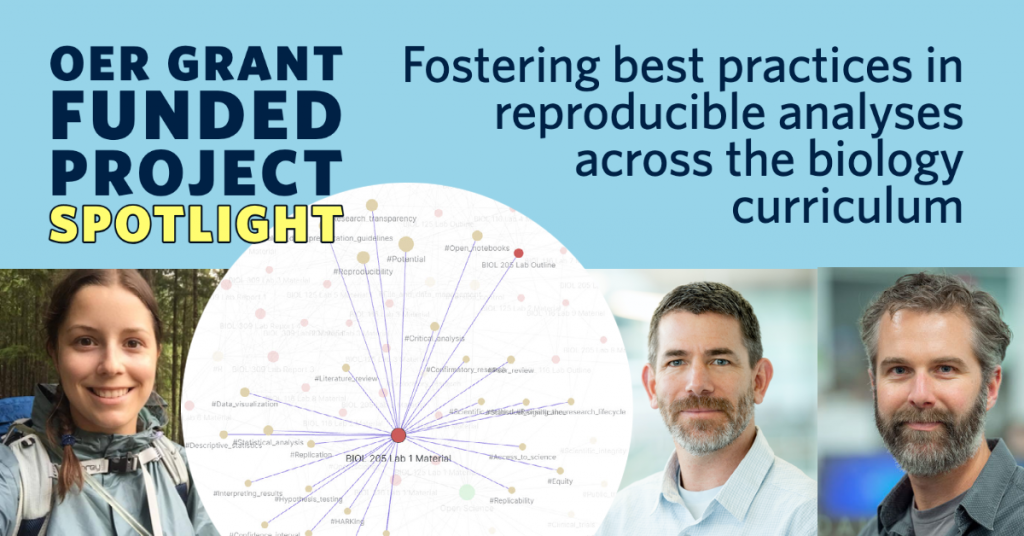
Project title: Fostering best practices in reproducible analyses across the biology curriculum
Project lead: Jason Pither (UBCO Faculty, Biology)
Project team: Mathew Vis-Dunbar (Librarian), Clerissa Copeland (BSc Hons.), Sharon Hanna (Support Analyst)
Background on the Open Educational Resource (OER) project.
Using the biology program as a pilot venue, the team is building open educational resources (OERs) that will support the development and application of reproducible lab assignment/experiment workflows by students, and through web-based, interactive network diagrams, highlight how biology courses across the curriculum are connected through common learning outcomes, particularly those related to study designs, statistical analyses, and workflows.
The connections will include short vignettes that will describe the nature of the connection and reinforce the focal learning outcomes, and provide common pitfalls (related to the topic) and their solutions relative to reproducibility. All materials used in the development of reproducible lab assignments and network mapping, including all outputs from these, will be made openly available for others to draw upon.
Why go Open?
A fundamental tenet of the scientific method is replicability: research protocols and outcomes should be fully replicable by independent researchers. In reality, the majority of scientific research cannot be replicated due to a combination of insufficient transparency and openness, poor study design, and flawed statistical analyses.
Efforts to address this “reproducibility crisis” are gaining momentum through the “open science” (OS) movement, but these efforts rarely target training undergraduate students. This is a missed opportunity as graduates of science programs could help push the culture change that is required to solve the reproducibility crisis, and ultimately make the science upon which public policy is based more sound.
The OER grant is helping the team to introduce, in a meaningful and connected way, practices and theories in scientific reproducibility, transparency, and rigour. Further, it is an opportunity to demonstrate similar approaches to the development of tools to support teaching and learning.
Project Impact for UBCO Students, Staff, and Faculty?
These resources will help to build discrete connections about core concepts, allowing students to clearly see how activities and processes in one class or lab are revisited and built upon in other classes and lab, providing a window into the undergraduate biology program in its entirety. This will also allow instructors and lab managers to harmonize their content, approach, assignments, and terminology across the program.
Additionally, it offers up, at the program level, the opportunity to learn not just how to do a given task in science, but an emphasis that is routinely reinforced, on the underlying principles of the scientific method, preparing them either as better future researchers, or engaged citizens with strong scientific literacies to inform how they engage in daily life.
Advice from the team for those considering OERs
It can be challenging to think of these classroom resources becoming living entities requiring continual updates, potentially in a collaborative manner, and the amount of time and effort one needs to invest for these to be successful. Grants like these OER grants are allowing us to tackle this in small, manageable chunks. We recognize that a key to success is to select a set of priorities to pick away at as opposed to having to re-imagine the full learning experience and the role of OERs in that experience overnight or in the scope of a single term.
Being able to co-develop classroom learning materials with students who have or are taking those courses provides invaluable insights into how content is interpreted by our learners. It’s an amazing learning opportunity for everyone involved, and has the potential, through release of these materials as OERs, to get undergraduate students building an academic CV.
Learn more
Learn more about the Open Educational Resources Grant Program and other grant funded OER project spotlights:
Context-Embedded Guided-Inquiry Learning Modules for Large Introductory Chemistry Courses
Introducing Ainu Content to Japanese Language Students